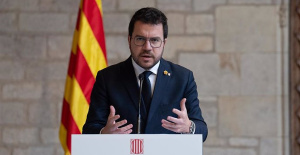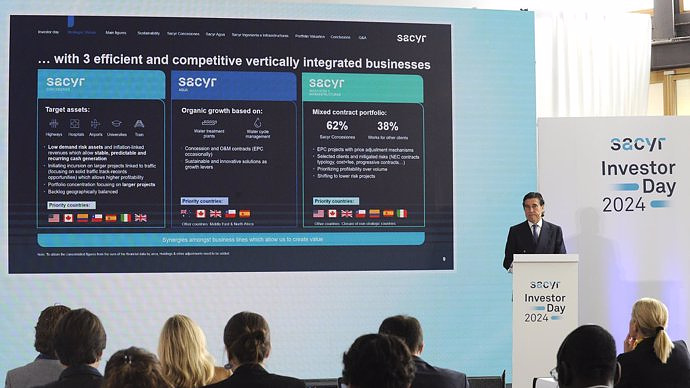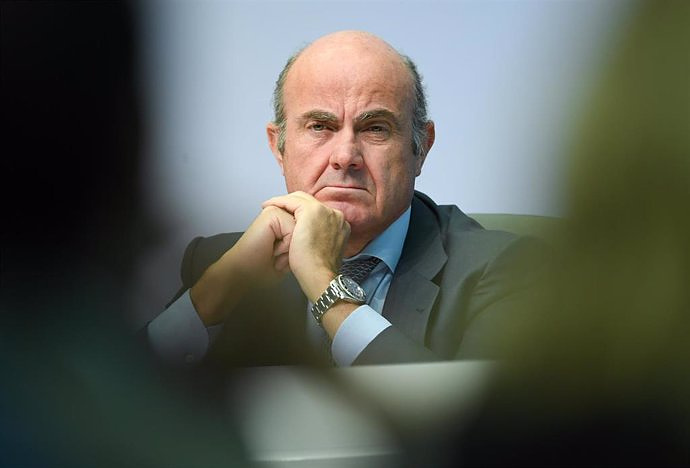He says that Spain supports limiting the price of Russian oil imports as requested by the G7
BRUSSELS, June 27 (EUROPA PRESS) -
The third vice president of the Government and minister for the Ecological Transition and the Demographic Challenge, Teresa Ribera, has revealed on Monday the interest of the Government in the design of Italy of a tax on the benefits "fallen from the sky" of the large energy companies -including electricity, gas and oil-- in the last year.
"We are seeing what other States around us have done. We are especially interested in the Italian case. We are looking for a way to introduce a tax on the differences in profits of energy companies in this last year", Ribera detailed at his entry to the Council of EU Energy Ministers in Luxembourg.
In this sense, the Minister for the Ecological Transition has detailed that the design of the tax in Italy "takes as a reference" the mechanism to limit the price of gas in the electricity market executed by Spain.
The Italian Government announced, last May, that it would raise the tax on the benefits of electricity companies to 25% from the initial 10%, to finance a package of direct aid to families.
A perspective measure to which the President of the Government, Pedro Sánchez, also referred last Saturday when he pointed out that Italy "is an example that we are looking at in a very particular way."
In any case, the third vice president has referred to the ministry led by Maria Jesús Montero for the design of this tax. "It is the Ministry of Finance that is studying the way in which this tax figure can work with all the guarantees and in accordance with the ordinary rules of our tax system", Ribera resolved about the debate, in the middle of the month, with the Minister of Labor and Social Economy, Yolanda Díaz, on the possibility of creating a tax for electricity companies through the General State Budgets.
Ribera has indicated that the "energy and oil companies in the results of this quarter show a bonanza that is well above what results in their real costs" and has warned of the "enormous benefit" of these companies "at the cost of prices extraordinarily high prices paid by all consumers". LIMIT THE PRICE OF OIL IMPORTS.
The Third Vice President of the Government has been in favor of introducing a price limit on oil imports from Russia and has indicated that she will ask the European Commission to speed up this work, in line with the debate opened this weekend within the G7 as a measure to reduce the profits of the Kremlin and the inflationary spiral of the economy in the EU.
"Yes, we must find a way to make this a reality," said the minister, who has defended Europe exercising its "market position" to put pressure on Russia and "prevent the war in Ukraine from escalating" .
Ribera recalled that the European Commission has already proposed a similar strategy, to carry out joint gas purchases at the community level, in its RePower EU plan, which aims to cut energy dependence on Russia in 2030.
"The G7 is discussing in line with what is already one of the elements of debate at European level, the setting of maximum purchase prices for energy raw materials from Russia. Not only gas, but also oil", the minister indicated. for the Ecological Transition.
The third vice-president added that Europe has been working for a year in this direction, that is, in the form of "better organizing our markets" in an "extraordinary" situation, considering that Europe "as a great actor in the market" can indicate the price who is willing to pay for that energy.
In a further step, he has indicated that it is not "affordable" for a market "as large as Europe to pay so much", taking into account that the costs of gas and oil production "have not changed, apart from the scarcity of products if we exclude Russian oil and gas.

 Exploring Cardano: Inner Workings and Advantages of this Cryptocurrency
Exploring Cardano: Inner Workings and Advantages of this Cryptocurrency Seville.- Economy.- Innova.- STSA inaugurates its new painting and sealing hangar in San Pablo, for 18 million
Seville.- Economy.- Innova.- STSA inaugurates its new painting and sealing hangar in San Pablo, for 18 million Innova.- More than 300 volunteers join the Andalucía Compromiso Digital network in one month to facilitate access to ICT
Innova.- More than 300 volunteers join the Andalucía Compromiso Digital network in one month to facilitate access to ICT Innova.-AMP.- Ayesa acquires 51% of Sadiel, which will create new technological engineering products and expand markets
Innova.-AMP.- Ayesa acquires 51% of Sadiel, which will create new technological engineering products and expand markets Weber (PPE) asks to vote for the PP in the European elections to "defend the rule of law" in Spain
Weber (PPE) asks to vote for the PP in the European elections to "defend the rule of law" in Spain Aragonès warns that "an incoherent agreement" in Catalonia would "difficult the collaboration" of ERC with the Government
Aragonès warns that "an incoherent agreement" in Catalonia would "difficult the collaboration" of ERC with the Government The attorney general justifies the recusal of TS magistrates and vindicates his "right" to defend himself
The attorney general justifies the recusal of TS magistrates and vindicates his "right" to defend himself Joselu allows him to dream about the 'Fifteenth'
Joselu allows him to dream about the 'Fifteenth' How Blockchain in being used to shape the future
How Blockchain in being used to shape the future Not just BTC and ETH: Here Are Some More Interesting Coins Worth Focusing on
Not just BTC and ETH: Here Are Some More Interesting Coins Worth Focusing on Expociència expects to receive more than 4,000 visitors in the Science Park of the University of Valencia
Expociència expects to receive more than 4,000 visitors in the Science Park of the University of Valencia They develop devices for the precise diagnosis of cancer patients
They develop devices for the precise diagnosis of cancer patients UMH researchers are working on a high-quality apricot crop that requires less irrigation water
UMH researchers are working on a high-quality apricot crop that requires less irrigation water The UPV develops an application to improve the quality of life of patients with glioblastoma
The UPV develops an application to improve the quality of life of patients with glioblastoma A million people demonstrate in France against Macron's pension reform
A million people demonstrate in France against Macron's pension reform Russia launches several missiles against "critical infrastructure" in the city of Zaporizhia
Russia launches several missiles against "critical infrastructure" in the city of Zaporizhia A "procession" remembers the dead of the Calabria shipwreck as bodies continue to wash up on the shore
A "procession" remembers the dead of the Calabria shipwreck as bodies continue to wash up on the shore Prison sentences handed down for three prominent Hong Kong pro-democracy activists
Prison sentences handed down for three prominent Hong Kong pro-democracy activists ETH continues to leave trading platforms, Ethereum balance on exchanges lowest in 3 years
ETH continues to leave trading platforms, Ethereum balance on exchanges lowest in 3 years Investors invest $450 million in Consensys, Ethereum incubator now valued at $7 billion
Investors invest $450 million in Consensys, Ethereum incubator now valued at $7 billion Alchemy Integrates Ethereum L2 Product Starknet to Enhance Web3 Scalability at a Price 100x Lower Than L1 Fees
Alchemy Integrates Ethereum L2 Product Starknet to Enhance Web3 Scalability at a Price 100x Lower Than L1 Fees Mining Report: Bitcoin's Electricity Consumption Declines by 25% in Q1 2022
Mining Report: Bitcoin's Electricity Consumption Declines by 25% in Q1 2022 Oil-to-Bitcoin Mining Firm Crusoe Energy Systems Raised $505 Million
Oil-to-Bitcoin Mining Firm Crusoe Energy Systems Raised $505 Million Microbt reveals the latest Bitcoin mining rigs -- Machines produce up to 126 TH/s with custom 5nm chip design
Microbt reveals the latest Bitcoin mining rigs -- Machines produce up to 126 TH/s with custom 5nm chip design Bitcoin's Mining Difficulty Hits a Lifetime High, With More Than 90% of BTC Supply Issued
Bitcoin's Mining Difficulty Hits a Lifetime High, With More Than 90% of BTC Supply Issued The Biggest Movers are Near, EOS, and RUNE during Friday's Selloff
The Biggest Movers are Near, EOS, and RUNE during Friday's Selloff Global Markets Spooked by a Hawkish Fed and Covid, Stocks and Crypto Gain After Musk Buys Twitter
Global Markets Spooked by a Hawkish Fed and Covid, Stocks and Crypto Gain After Musk Buys Twitter Bitso to offset carbon emissions from the Trading Platform's ERC20, ETH, and BTC Transactions
Bitso to offset carbon emissions from the Trading Platform's ERC20, ETH, and BTC Transactions Draftkings Announces 2022 College Hoops NFT Selection for March Madness
Draftkings Announces 2022 College Hoops NFT Selection for March Madness




























